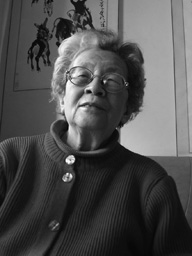FENGMING A Chinese Memoir
 CHINA / 2007 / Chinese / Color / Video / 183 min
CHINA / 2007 / Chinese / Color / Video / 183 min
Director, Script, Photography: Wang Bing
Editing: Adam Kerby
Sound: Shen Jinguang
Producers: Lihong K., Louise Prince
Production Companies: Wil Productions Ltd., Aeternam Films, Fantasy Pictures
Source: Wil Productions Ltd.
An elderly woman walks along a snowy road toward her apartment. The name of this woman, dressed in red as she sits on her sofa, is He Fengming. She worked as a reporter for a local newspaper and married, but an article written by her reporter husband got them labeled as right-wing agitators, and they were sent to separate forced-labor camps . . . This work presents her magnificent story spanning some three decades, from her repeated persecution under the 1950s anti-rightist campaign and the Cultural Revolution through her rehabilitation in 1974.
[Director’s Statement] When I first met He Fengming in 1995, I had already heard of her and her work. It wasn’t until a few years later that I realized how hypnotic her story is, when I read the book she published in China, My Life in 1957. 1957 was the year when the Anti-Rightist Movement began. In her book, Fengming remembers how she and her husband were sent to the re-education camps, where, like many others, they faced hard labor, starvation, and humiliation—and for her husband, death, leaving Fengming alone with their two children. In her later years, Fengming defied pressure from those around her and wrote down her story, in ink and tears.
Fengming’s generation is so important because they lived through all the major political events of the last 50 years in China. By telling their story, I want to give young people today a chance to learn more about the history of their own country, and to realize what radical changes have taken place in the last few years.
I grew up in the countryside with my mother, who worked hard in the fields, and often helped her when I was a kid. As a child, I often went to “struggle” meetings in the village where “bad elements” who had been sent there for re-education were criticized. Fengming’s memories are very real for me. She is an educated, independent old lady who is really representative of that period. Not many people in her generation are willing to be interviewed. Most of them find it hard to face their past and summon the courage to talk about what they went through.
I think people will be moved by this life and this testimony. I myself became totally absorbed in Fengming’s story as I was filming her, and I really think the audience will share that experience.
(edited from press release)
 Wang Bing
Wang Bing
Born in 1967 in Shaanxi province. Receiving his B.A. in photography from the Luxun Arts University of Shenyang in 1992, Wang entered the Beijing Film Academy cinematography department in 1995. He began working as an independent filmmaker and director in 1998. In 1999 he worked as a cameraman for the independent feature film Distortion and directed his first documentary, Tie Xi Qu, shooting until the end of 2001. Tie Xi Qu was selected for the 2002 International Forum of New Cinema at the Berlin International Film Festival and awarded the prize for Best International Documentary at the Lisbon International Documentary Film Festival, the Grand Prix at the 2003 International Documentary Film Festival (FID) in Marseille, and the Robert and Frances Flaherty Prize at YIDFF 2003. Fengming received the Georges de Beauregard International Prize at the 2007 FID Marseille. |
